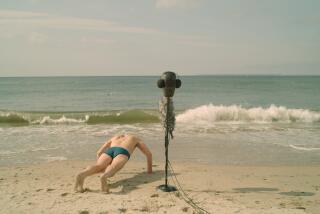Review: Silence is indeed golden in the documentary ‘In Pursuit of Silence’

Kenneth Turan reviews “In Pursuit of Silence,” a film about our relationship with silence and the impact of noise on our lives. Video by Jason H. Neubert.
A lone tree sits in a field of the greenest grass. That’s it. It’s nothing but it’s everything, a vision of the kind of wordless tranquility we are likely searching for but even likelier finding hard to achieve.
That shot opens “In Pursuit of Silence,” a remarkable documentary that paradoxically proves that when it comes to silence, there is a lot to be said as well as a great deal to be shown.
Half visual essay, half verbal investigation, “Silence” is thoughtful and informative as well as contemplative and restorative. It both tells you why you perhaps yearn for silence and shows you what it would look like if you could find it.
Director/editor/co-cinematographer Patrick Shen, backed by not one but two Kickstarter campaigns, spent more than two years in eight countries filming in some of the quietest spots he could find as well as some of the noisiest.
In a nice touch, Shen not only identifies locations but also their decibel count, which range from minus 9.4 dbs in the celebrated anechoic chamber in Minnesota’s Orfield Labs to festival time in Mumbai, the loudest city in the world, where the db count is 107.
Similarly, Shen made sure to film a span of silence with each of the writers, scientists and academics he interviewed, and some of that footage has memorably made it into the final film.
Yet another of “Silence’s” unexpected touches is to begin with four minutes and 33 seconds of “experiential silence” as a tribute to composer John Cage’s celebrated — and equally silent — composition “4’33”,” which incensed audiences when it debuted in 1952.
Another equally intriguing recurring figure in “Silence” is an intrepid young man named Greg Hindy, who, just out of college, decided to walk across the country from east to west without saying a word, communicating only by writing on paper cards.
Despite its title, though perhaps inevitably, “Silence” spends a chunk of time dealing with noise, visiting places like a public school in Queens, N.Y., where proximity to a subway train makes education extremely difficult.
Experts tell us that excessive noise, in addition to being unpleasant, is bad for our health, with one person summing up by saying “you cope with it but you don’t get used to it.”
Much of the film’s time, however, is in some of the most tranquil spots on Earth, searching for “the language of the great silent places” in locations like Alaska’s Denali National Park and the Urasenke Tea House in Kyoto.
Some of these places, as it turns out, have religious connections, like a Trappist monastery in Iowa and a remote Zen Buddhist temple in Japan. Not surprising, given that we’re told that Indian mystic Ramakrishna said “find silence and you will find God” and that early Christian theologians believed that “the ultimate worship of God is silence.”
Even nonbelievers get into the act, with a scientist in Japan talking about proof that silence strengthens the immune system, leading to the establishment of about 60 “forest therapy” locations in Japan.
Though its gorgeous images and meditative mood leave the most lasting impression, “Silence’s” words, aphorisms like “silence is the resting place of everything essential,” are always evocative even when, as is sometimes the case, the person who’s speaking is not identified.
“Noise distracts us,” one observer says, “silence returns us to what is real.” If you don’t believe that when “In Pursuit of Silence” begins, you will be convinced by the end.
-------------
‘In Pursuit of Silence’
Not rated
Running time: 1 hour, 21 minutes
Playing: Laemmle’s Ahrya Fine Arts, Beverly Hills
See the most-read stories in Entertainment this hour »
Movie Trailers
More to Read
Only good movies
Get the Indie Focus newsletter, Mark Olsen's weekly guide to the world of cinema.
You may occasionally receive promotional content from the Los Angeles Times.










